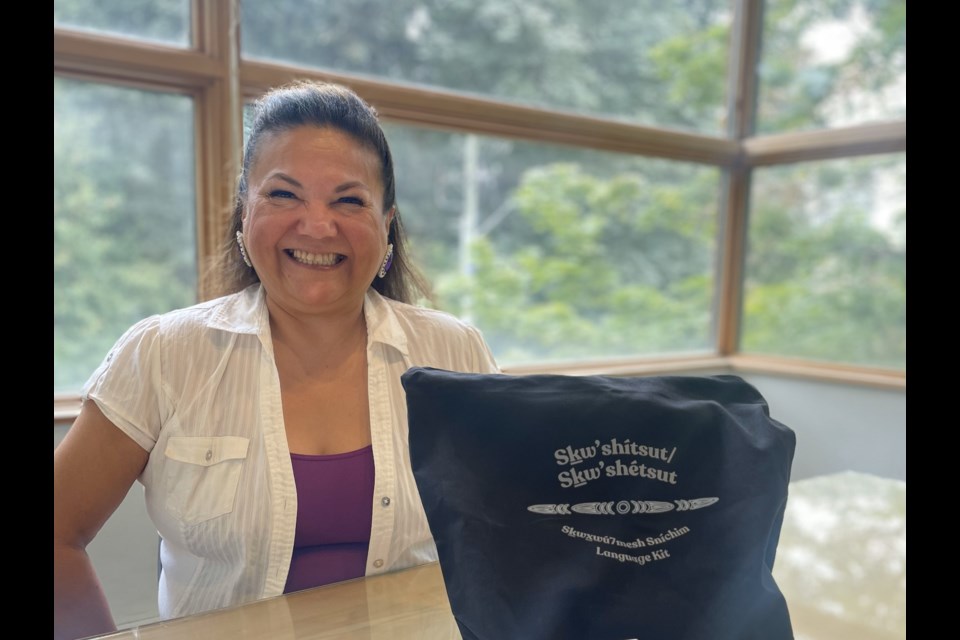Many Indigenous languages have been nearly or completely lost due to colonial policies and practices, but one Sḵwx̱wú7mesh Úxwumixw (Squamish Nation) speaker and knowledge keeper is changing that.
West Vancouver Memorial Library now has Skwxwú7mesh Sníchim (Squamish Language) kits for people to borrow to help revitalize the language and culture.
“These kits are more than just educational resources – they are a crucial part of our collective effort to revive and sustain the Skwxwú7mesh Sníchim language for future generations,” said Tsitsáyxemaat (Rebecca Duncan).
Tsitsáyxemaat is a Skwxwú7mesh Sníchim speaker and knowledge keeper who has been speaking the language for nearly 40 years. She’s honoured to now have both the language and kits out there for people to use, she said.
Each kit includes a Squamish to English dictionary, an audio player to learn pronunciation, and alphabet blocks showing the letters and numbers of the language. Opposites and animal flashcards, as well as a foraging walk guide learning about land-based teachings, are also included in the kit.
But another component is Stl’ashn Skw’shítsut, also known as Potlatch, a co-operative game that teaches the idea of a shared economy.
The game highlights traditional plants, medicines, customs and cultural elements that are all significant to the Squamish people, said West Vancouver Memorial Library librarian Kendra Sakamoto.
“It’s a language game, but it’s also a really great introduction to Squamish culture as well,” Sakamoto said.
Potlatch focuses on a shared, circular economy, Sakamoto says, adding that the object of the game is for everybody to work together to win.
“It’s kind of counterintuitive to a lot of western style games,” she said.
The library partnered with Tsitsáyxemaat as part of their commitment to reconciliation and efforts to support language preservation. Sakamoto said she worked with Tsitsáyxemaat on a previous project roughly two years ago about naming native plants in the library’s community demonstration garden. That's where a conversation sparked about making the language easily accessible to the public and Squamish Nation community, as there hadn’t been many published resources.
Brief history of Skwxwú7mesh Sníchim
Historically Skwxwú7mesh Sníchim was an oral language without a formal writing system.
Various writing systems have been developed over the years, dating back to the 1880s. But the most recent system you see today was adopted as the official one by the Squamish Nation in 1990 and used by most contemporary language speakers, according to the Sníchim Foundation website.
Skwxwú7mesh Sníchim is one of the 10 languages within the Coast Salish branch.
The Salish language family is comprised of five branches, with each one sharing similarities with one another. There have been 23 Salish languages spoken historically, in southern B.C., Washington State, the Oregon Coast, Idaho and Montana.
Today, there are only a dozen fluent Skwxwú7mesh Sníchim speakers and more than 200 learners, but Tsitsáyxemaat has seen that number grow compared to when she first learned the language at age 16 from her late Papa. She said she immediately felt the excitement of learning the language, and picked it up quickly.
“I’ve dedicated pretty much three quarters of my life to language and culture, and there was one time we were only seven fluent speakers,” she said.
‘A great way of putting action into reconciliation’
Tsitsáyxemaat says this is a step forward in reconciliation, and hopes to expand the language kits to other libraries in the future.
“I hope to expand these and create more relationships with more organizations who are willing to share and support,” Tsitsáyxemaat said. “It’s such a great way of putting action into reconciliation.”
Libraries are in a unique position to help with this work, Sakamoto said, as they are community gathering places and can build relationships with the work of language revitalization.
“We think of language as a means of communication, but it’s really so much more than that, it’s the foundation of culture,” Sakamoto said. “So, preserving language is critically important.”
The language kits can be accessed with almost any library card in B.C., Sakamoto said. A person interested in the kit would need to show photo ID and proof of address to put the kit on hold with their library card.
For more information visit the West Vancouver Memorial Library website.
Abby Luciano is the Indigenous and civic affairs reporter for the North Shore News. This reporting beat is made possible by the Local Journalism Initiative.



